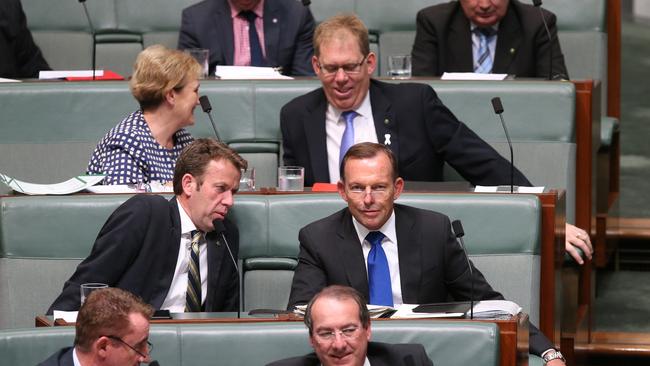Women in politics still face outdated barriers
WOMEN make up roughly half of the population but that’s not reflected in Australia’s parliaments, where outdated attitudes are still evident, writes Annika Smethurst.

Opinion
Don't miss out on the headlines from Opinion. Followed categories will be added to My News.
LADIES, listen up: there are not enough of you in Canberra. And by Canberra, I don’t mean the city. I see plenty of you jogging around Lake Burley Griffin, heading off to work or sipping lattes on the Kingston foreshore. But there aren’t enough occupying offices in Parliament House. And it’s not just Canberra, but Parliaments across Australia.
Trust me, I’ve worked in a few. When another bloke gets to his feet, my eyes begin to dart around the chamber and I’ve noticed women can be hard to spot.
Females fill at least half the seats in the public gallery and make up about 50 per cent of school groups. We have strong representation among Hansard, the clerks, attendants and even the press gallery seems evenly split.
But on the chamber floor, women can be hard to find.
One in four MPs in the House of Representatives and about one in three federal senators is female. According to a parliamentary research paper, the representation of women in Australia’s Parliaments hovers around 30 per cent, which the UN sets as the minimum level for women to influence policy.
The Liberal Party has a self-identified problem with women and not just in its ranks — it has a declining female vote. In the 150-seat Lower House, there are 74 Liberal MPs but only 16 are female. And only six of the 27 Liberal senators are women. None are Victorian. Over on the other side, Labor discovered a few decades ago it also had a problem and passed its first affirmative action quota, requiring women to be preselected in 35 per cent of winnable seats at all elections by 2002.
While far from a solution, affirmative action has worked if the only measure of success is more Janes and fewer Jameses on the chamber floor. But any system that values gender over merit may harm those it’s supposed to help. It looks good on paper but does little to tackle the cultural barriers that prevent females from chasing political careers.
It can even subtly weaken the credibility of women by casting doubt over whether they can get ahead without a hand. The Liberals aim to double the number of women they have in Parliament in the next decade using targets, not quotas. While admirable, actions will speak louder than words.

Women are an untapped resource in politics and encouraging more to be involved surely improves the overall talent pool and will go some way to naturally lifting standards.
In Victoria, the Liberal Party has a rare opportunity to preselect a new candidate for a safe Senate spot made vacant by the resignation of Michael Ronaldson.
A number of male candidates have come forward, and good on them. Some would be more than capable of serving and offer a range of skills, talents and experience.
But a move by Liberal heavyweights to back two female candidates has caused a stir.
Those opposed to an all-women ticket labelled it tokenism and huffed about how “unfair” it would be to bump a candidate from third place up to the top spot.
But even some supporters of the idea I spoke to resorted to using outdated benchmarks for the female candidates. None mentioned the marital status or appearance of the men, but “presentable”, “gentle” and “mother” were actually used as selling points for the female candidates.
If political players are comfortable using such archaic descriptions to a female reporter, who knows what language they use behind our backs. Oh wait, thanks to Peter Dutton, we do.
Adopting a language, attitude and an approach that encourages the best person for the job to apply, regardless of sex, colour or creed, will do more than targets or quotas.
Almost a decade ago, as an undergraduate politics student at Monash University, a nightly current affairs show interviewed my class on comments about Julia Gillard’s ability to lead given she had never had children. I remember thinking how daft the whole thing was. It’s embarrassing that a decade on we are still trying to foster an environment where women feel they can succeed.
Merit alone should dictate who represents us in Parliament, but the best person for the job should not face any barriers. Men and women should be measured by the same criteria, not boosted or constrained by their sex.
ANNIKA SMETHURST IS A HERALD SUN FEDERAL POLITICS REPORTER


